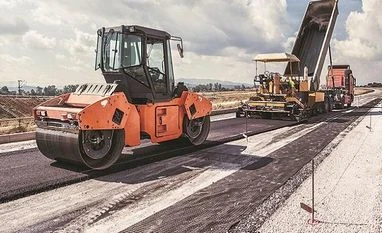Infrastructure companies are enthused by the announcements made by the finance minister in the Budget on Monday as the government laid out Rs 5.54 trillion for capital creation in the sector. This, according to the sector’s chief executive officers (CEOs), will result in more orders.
It also brought cheer to the auto sector, given that the scrappage policy will help revive demand for new cars and trucks, felt corporate leaders from the sector.
The government allocated Rs 1.18 trillion for the roads and highways sector and another Rs 18,000 crore to public transport.
About 8,500 km of road and highway projects are being planned to be awarded by March 2022. These include the new road corridor projects. The corporate leaders said this will help companies like L&T-IDPL and IRB Infrastructure, which are bidding for new road projects. The orders from road and railway projects will also increase demand for cement and steel companies like Ultratech and Holcim.
The Budget has made an allocation of Rs 1.1 trillion to capital expenditure, including the railway corridors. “The National Rail Plan 2030 — to create a future-ready railways system — will be critical for boosting and bringing investment to the railways sector,” said Abhaya K Agarwal, partner at EY India.
The aim is to complete 11,000 kms of national highways, seven port projects worth Rs 2,000 crore with private participation and boost infrastructure to connect metros (such as Mumbai) to smaller cities like Nashik. These will result in more orders to railway wagon makers, apart from benefiting other suppliers.
“With its thrust on capex (capital expenditure) with higher outlays for roads, railways and infrastructure, the Budget has combined and addressed the needs of today. The economy was slowly coming out of the pandemic and this increased capex by the government will accelerate recovery of the sector,” said N Srinivasan of India Cements.
“By these measures, the government has done a fine job of reviving growth impulses in the economy. This Budget, therefore, attempts to reinforce the health, physical and financial infrastructure so that the economy is never caught in a similar situation. What is also truly radical is that the government has outlined a vision of increasing its focus on strategic investments and monetising government assets at the right time,” said Prashant Ruia, director at Essar Capital.
Top executives of the automobile sector said the vehicle scrappage policy will help it bag new orders. “The long-awaited voluntary vehicle scrappage scheme to phase out old vehicles will give an impetus to the automotive industry,” said Gopichand Hinduja, co-chairman of the Hinduja group, which owns Ashok Leyland.
Sources said after scrapping old vehicles, the owners may be entitled to a waiver of the registration fee and a discount on the road tax.
The incentives have been proposed by the ministry of road transport and highways, in its long-pending draft vehicle scrappage policy.
However, some executives of the automobile industry said the move will largely impact sales of commercial vehicles like buses and trucks but is unlikely to give a fillip to personal vehicles. It will, however, benefit the entire value chain of commercial vehicles, ranging from vehicle makers to ancillary companies, including tyre and component manufacturers.
CEOs from the real estate sector said the lockdown — due to the Covid pandemic — has caused a lot of disruption and hit the sector hard. So, the government should have taken more steps to provide relief to the industry, they felt. “We had expected the government to do more for the sector because of the multiplier effect Covid has had on economic growth,” said Sanjay Dutt, managing director & CEO, Tata Realty & Infrastructure.
With inputs from Arindam Majumder
Unlock 30+ premium stories daily hand-picked by our editors, across devices on browser and app.
Pick your 5 favourite companies, get a daily email with all news updates on them.
Full access to our intuitive epaper - clip, save, share articles from any device; newspaper archives from 2006.
Preferential invites to Business Standard events.
Curated newsletters on markets, personal finance, policy & politics, start-ups, technology, and more.
)